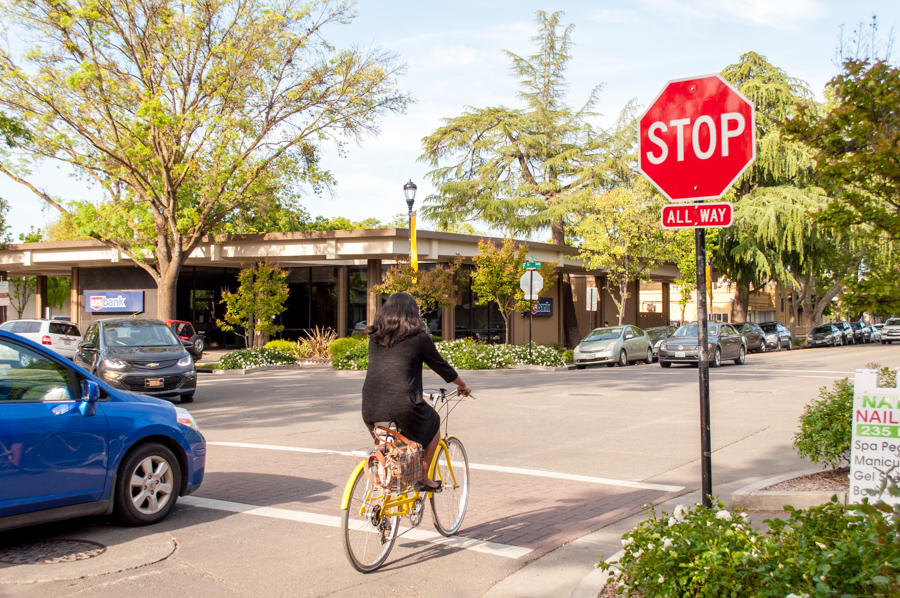
“Idaho Stop” in Davis: Beneficial to cyclists, threat to bike safety
For as long as anyone can remember, all road vehicles — whether bicycles or automobiles — followed a “same road, same rights, same rules” philosophy. Yet, some cyclists claim that the new proposed California law, the “Idaho stop,” would make roads safer for bicycles in particular. The law also brings up a number of concerns.
As part of the proposed law, bicyclists will still have to stop at traffic lights but will be allowed to roll through stop signs after they determine it is safe to proceed. Some people worry this could create a grey area in the law, since that determination is left up to the discretion of the cyclist themselves. It may also create an additional risk to children bikers who often lack a firm grasp on road safety.
“[The proposed ‘Idaho stop’] will end up being an enforcement thing,” said Bob Bowen, the U.S. Bicycle Hall of Fame president. “I see both sides of the issue. There are bicyclists who are in favor of that who say, ‘Why should we stop if nobody is around?’ On the other side, there will be people that…blow through the stop sign even when traffic is coming. So, that’s the grey area that remains to be seen. We just want people to be safe.”
For towns without a heavy bicycle presence, this may not be a very disputed issue, but for Davis, a town with approximately 20,000 bikers, residents have become increasingly concerned. Tim Bustos, the UCD Bicycle Program Coordinator, said road safety may be at stake in Davis if the law passes. However, as a lifelong cyclist and full-time bicycle commuter, Bustos also sees the potential convenience of the law.
“A lot of bicyclists have concerns about stopping at every traffic light,” Bustos said. “You know a cyclist isn’t going to seriously injure someone in a car because their bike accidentally hits them. We’re not as much of a threat, and the other thing from a standpoint of bike-commuting and riding and traffic: we’re actually safer road users because we have better visibility in a bike than we do in a car.”
However, much like other Davis citizens, Bustos realizes the potential for crashes in Davis is much higher due to the high volume of bikes in town and on campus.
“The flip side is that we’ve got a pretty high crash rate in regards to bicycles in Davis and many communities,” Bustos said. “You take 20,000 or so bicyclists and you place them on fairly small streets, and many of them have very little training, if at all. There’s a real concern that there are going to be an inordinate number of bicycle crashes.”
Bustos often sees cyclists with no hands on the handlebars looking down at the ground and at their handheld devices to check their emails while they’re riding at high speeds, particularly on the university campus, which would cause a true safety concern with the addition of the Idaho stop.
However, for those who are experienced cyclists, much like those in Bike Davis, a nonprofit group in Davis that promotes bicycling through advocacy, education, encouragement and design, the rolling stop law proposition increases their safety while cycling.
“As an organization, Bike Davis does support the Idaho stop, largely because they believe it increases safety among bicyclists at four-way-stop-intersections, mostly because it is safer to be moving on a bicycle than it is to be stopped,” said Trish Price, the president of Bike Davis. “Starting and stopping is really the most vulnerable time to be on a bicycle. So, if you stop less, you generally have better control and that makes you safer.”
The loss of momentum when cyclists stop causes them to linger in the intersection longer, increasing the likelihood that they may be hit by oncoming automobiles or other bikers. Bike Davis also recognizes that there must be an educational component as part of the proposed law so that people fully understand the law and its yielding principles.
Written By: Bianca Antunez —city@theaggie.org



